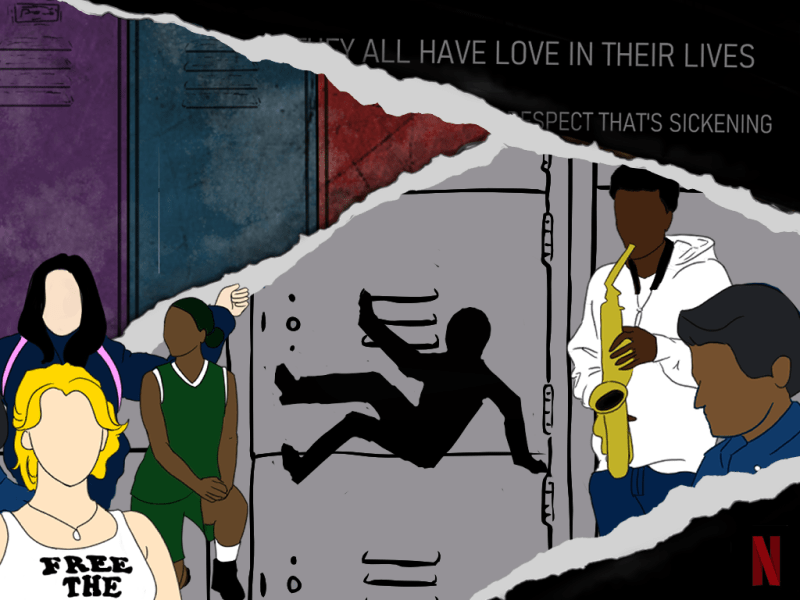The drama “Grand Army” premiered on Netflix in October 2020. It is based on playwright Katie Cappiello’s “Slut.” The series highlights conversations on race, sexuality, economic class, equity and access.
“Grand Army” follows five high school students attending the fictional Grand Army High School — the largest public high school in Brooklyn, New York — which also happens to be one of the most prestigious. The show takes viewers on a journey with these five students as they grapple with personal challenges, as well as larger institutional and societal ones.
From the start, the show illustrates how intelligent the characters are as they think critically about the world — like how Dom understands the need to increase access to mental healthcare for her community and how Joey remarks on the misogynistic rhetoric of “The Great Gatsby” in class. Further, I appreciate how the show depicts “high-achieving” students of color, since these characters and identities have historically not been represented on the screen.
The series creates an enjoyable balance between demonstrating the difficulties encountered in the weird experience that is high school, and larger issues including racism, elitism and harassment. For instance, characters juggle pleasing peers, meeting academic demands and coming to terms with their identifies and values. Though “Grand Army” is partly a coming-of-age story, it is much more: it highlights what it is like to come of age in a globalized world where information is more readily available than it has ever been. Being a young adult is different now than it was in the past.
Students in the series are tasked with being students while simultaneously navigating their hardships and feeling unseen. This theme manifests differently throughout the series. One instance: the Black Student Union organizes a sit-in to demand institutional changes, such as the suspension policy at their school. Another: Dom feels invisible as she weighs dating someone she wants to date against entering a prearranged marriage to help alleviate some of her family’s financial hardship.
I also appreciate the show’s intent behind showcasing just how strong women are. Joey owns her body and seeks changes to the dress code at her school. Through this process, she is met with opposition from one of her teachers. In this way, the show introduces how ridiculous school policies can be, as well as how students are sometimes regarded as inferior to school administrators. Further, the show depicts a household matriarchy by showcasing how Dom and her female family members must provide for their family.
In regard to equity and access, the show illustrates the ongoing disparities in education, career and healthcare opportunities across different characters.
I was struck by the decision to make Jayson and Owen saxophone players. Firstly, the show’s writers created two Black students who are so dedicated to playing the instrument that they are constantly seen practicing. While this detail may be brushed off by some, it definitely resonated with me. Rather than depict the stereotypical Black male, the drama created real characters who possess interests and identities that divert from those prescribed to them. Secondly, Maliq Johnson (Jayson) and Jaden Jordan (Owen) actually play the instrument (and pretty well) in the series, as opposed to being replaced in musical scenes by stunt doubles. Another reason the saxophone detail stood out is Owen’s attainment of a spot in the All-State honor band, which is typically exclusive to students of privileged backgrounds. Not only that — Owen earns the principal alto saxophone chair at All-State.
Dom is challenged with providing for her family while also figuring out what her next steps are — including applying to college as a first-generation, low-income student and navigating the employment search. Her mother and sister are seen working many quite-literally back-breaking hours, and, as a result, sustain injuries they cannot remedy because they lack access to healthcare. This plot point contrasts with the lifestyles and opportunities of other characters — like Joey, who lacks an understanding of her own privileges: her home is more upscale, her parents can afford lawyers and at one point, she attends a private school.
“Grand Army” is an exciting show that has a lot to offer. It takes the audience through the complex world of modern adolescence via the lens of high school teenagers. It is effective in communicating how rapidly times are changing, as well as depicting how current and future generations are stepping into these changes. It simultaneously discusses issues through each of its main characters, and thus creates an intimate yet interconnected experience. Most importantly, it reflects the identities and experiences of its audience members.
Contact Rosana Maris Arias at rosmar18 ‘at’ stanford.edu.
